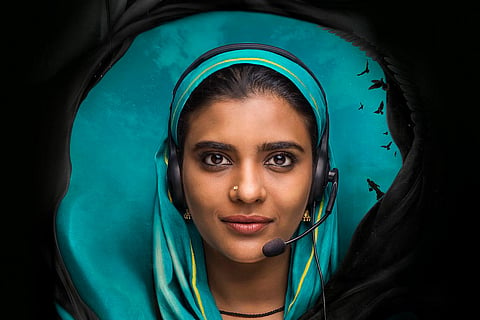

Farhana, a young married Muslim woman, defies a conservative father to start work at a call centre. Her father and husband make little money from the tiny shoe shop they own in the busy bylanes of Triplicane in Chennai. Farhana’s job will make life easier, but her father doesn’t believe in women working outside the home. Her husband Karim, on the other hand, is a soft-spoken, supportive presence, as Farhana steps into a corporate world dazzlingly new to her. She does well on the job, discovering exhilarating new independence. These are rare portrayals in Kollywood or any other Indian cinema industry—so there is much that director Nelson Venkatesan gets right in Farhana, starring Aishwarya Rajesh as the titular character.
A mainstream movie with an empowered Muslim woman character in times of virulent Hindutva politics is quite rare. Even rarer is a film that neither patronises its Muslim woman characters nor bases them on Islamophobic rhetoric like The Kerala Story does, for example. Yet, Farhana has been caught up in controversy, perhaps because of a very particular plot point.
When Farhana asks to be moved to a new department at her office that offers better incentives, she doesn’t realise until it’s too late that the job is in the phone sex chat industry. The film doesn’t attempt to pass judgement on people who use these facilities, nor does it vilify those who work in such companies. But it does give Farhana the space to express her shock, discomfort, and ultimately her own reasons for staying on the job.
She strikes up an unlikely friendship with one of her callers–a man whose identity and the actor playing him, the film takes great pains not to reveal for most of the run time. I’ll refer to him as The Caller so as to not spoil the big reveal.
Farhana finds herself comfortable speaking her mind to The Caller who seems interested in talking about anything but sex. She feels heard and seen in ways she does not around her own family, but of course, rather predictably, The Caller turns out to be an obsessive, predatory man.
How Farhana deals with the sudden, sickening turn of events with The Caller keeps you thoroughly engaged. While there are moments wherein the film verges onto unnecessary dramatics, such sequences are only a handful.
This is Farhana’s story—a daring, vulnerable, movingly realistic young Muslim woman who ultimately, albeit with a little help, saves herself. There are no larger-than-life male heroes to swoop in at the last moment to rescue the woman in distress. No man here is mouthing punch dialogues to resounding cheers from fans. Instead, when Farhana speaks her last words to The Caller after saving herself, she radiates a quiet power and dignity impossible to forget.
Such representation is quite precious both for itself and for its rarity in cinema. Even rarer is an actor who pulls it off with such conviction, you see the character leap to life in front of your eyes, even though she wears the face of someone as recognisable as Aishwarya Rajesh. The actor has repeatedly proven from as long ago as Vetrimaaran’s Vada Chennai that given a well-written female character (another rarity), she can outshine everyone else in the scene with her.
From her first longing gaze at a working woman’s handbag to the delight in her everyday defiances, her exchanges with other female colleagues to the warm glow of her initial friendship with The Caller, Aishwarya lets you keenly experience each moment alongside Farhana. The actor has you wishing deeply for more such portrayals of women, particularly from marginalised communities.
The rarity of a Farhana in cinema is also perhaps why there is so much scrutiny of this film. Some of the pushback to the film is clearly misguided, claiming that the film shows a Muslim woman doing sex work. The story of Farhana is more complex than that.
It also asks how we view the practice of sex chat facilities. Is it possible to have a liberated view of sex and simultaneously point out how such facilities can be used to cause harm? Contrarily, is it also possible to consider the benefits of sex chat facilities without moralising the theme?
The film makes an attempt to urge viewers to ask these questions of themselves, though it does water down its own stance a little bit. Besides such films being rare in Indian cinema, the film is ultimately made by an outsider to the community it turns its gaze on. This aspect of the film leaves me with one last question:
When will more individuals from minority and marginalised groups be able to tell their own stories, and how would a Muslim woman director have chosen to tell us a story like Farhana?
Disclaimer: This review was not paid for or commissioned by anyone associated with the film. Neither TNM nor any of its reviewers have any sort of business relationship with the producers or any other members of its cast and crew.
Also read: